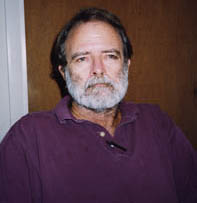Thousands of Gulf War vets have reported having chronic fatigue, joint and muscle aches, memory loss and rashes. Called the Gulf War Syndrome, these apparently disparate and mysterious ailments were ignored for years by the Veterans Administration. Vets from the Gulf War who had these symptoms considered themselves lucky if they'd sustained other injuries that the VA recognized, would treat, and would compensate them for having.
When one researcher, entomologist James Iredell Moss, came upon a possible cause for Gulf War Syndrome, he was told to stop his research—and that if he didn't, his career was at stake.
This was 1993, soon after the Gulf War. Moss was working at the Medical and Veterinary Entomology Research Laboratory in Gainesville, Florida, looking for a better way to kill cockroaches. In that process, he found a toxic relationship between two chemicals that had been used extensively by American troops in the Gulf War.
One was an experimental pill that was supposed to protect soldiers from the effects of nerve gas—pyridostigmine bromide, or PB. The other was DEET, a common repellant troops used to ward off insects. Moss's research showed that these substances became lethal when combined—killing cockroaches quite effectively. That was good for his cockroach research but not a good combination to use around humans.
Moss was ready to see if his theory checked out, possibly explaining Gulf War Syndrome. Instead, he was ordered to stop his research.
The lab where Moss worked was run by the US Department of Agriculture, which had invented DEET in the 1950s and tested it in that very lab. A top USDA official called the lab to say Moss should stop spreading rumors about the insecticide. The lab director ordered Moss to stop his "unauthorized" research on DEET and warned that his career was in danger. And it clearly was.
Moss was invited to testify at a Congressional hearing. He accepted. His testimony opened a door for thousands of Gulf War veterans who were sure that Gulf War Syndrome was real and might have been caused by our own use of chemicals. His testimony opened the door for researchers at Duke University who were able to validate his findings about DEET when it's combined with other chemicals. But it closed a door for Moss himself. His contract was dropped, and it was four years before he worked fulltime again.
Sen. Jay Rockefeller, who had invited Moss to testify, described him as a researcher "who had a tremendous amount to contribute" and a patriot who has been "junked" by his government. The senator said, "He discovered through his own scientific curiosity that an insect repellent, DEET, used by perhaps 70 million Americans, may in fact be implicated in a serious public problem."
Though Moss paid a heavy price for his whistle-blowing, he said afterward that he was glad he'd done it. His appearance at a Congressional hearing gave his preliminary findings a future. "This stuff was buried until I went to the Senate hearings," Moss said. "It would have been buried forever."
Since 2006 Jim Moss has been a chemist, technician and lab manager at the University of Florida's Department of Animal Sciences, doing research on environmental factors that affect vertebrate embryos.
Who knows what he'll find next? Whatever it is, it won't be swept under a carpet.

